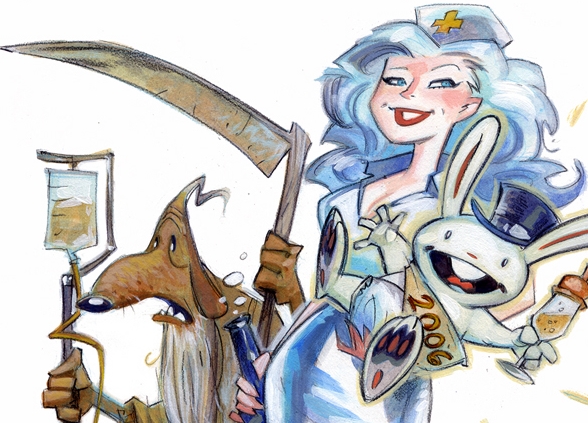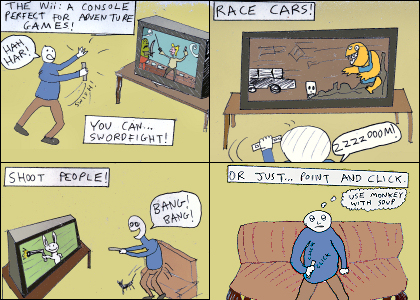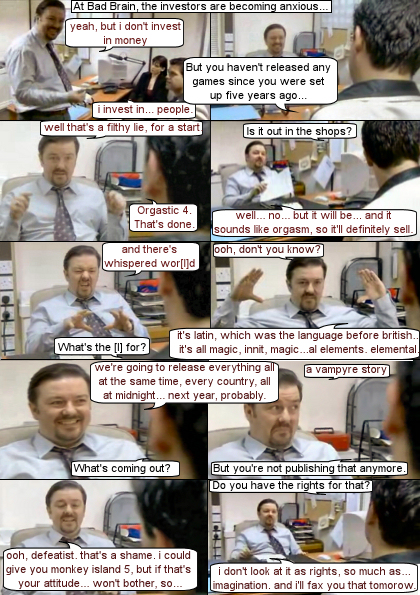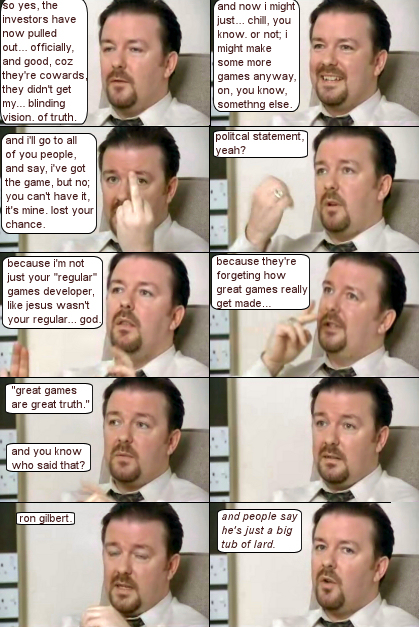Articles

2006: A Year in Review Page One
Gabez became very, very angry, and shouted “all of this has to change!” motioning vaguely at the direction of old man 2006, lying in a puddle of his own filth in the corner of the room.
ADVENTURE GAMES: 2007 AND BEYOND
I was reading a games magazine recently that said that Broken Sword IV showed that the genre “wasn’t quite dead yet.” How many times are we going to have to hear this? It seems that every other day someone declares that the genre’s gone forever, and they’ve been saying this for ten years, but it’s never been true.
Sure, the golden age has stopped – I don’t think we’ll ever see the kind of time where a company like LucasArts is flinging out triple A titles, where you’ll see the latest new title in the genre put on proud display in your local games emporium (the curious exception to this is Germany), but that’s okay. Just because the empire’s gone, doesn’t mean we can’t have a commonwealth. Adventure games have changed: they’ve adapted, become more cinematic, with a bit more action, a bit more... crate pushing; but they’re still here, and still adventure games.

I think it’s a genre that’s becoming more prominent as other genres begin to drift into sameness. When was the last time you played a truly original FTP, RPG or RTS? A lot of the games in these genres are good, and they do the job very well, but I’m seeing the same old characters, the same old settings.
Innovation is around in the games industry, but I think it’s most alive in the adventure genre. Not so much with gameplay, which I admit is pretty formulaic, but instead with what’s ambiguous referred to as “style,” which is a word usually thrown in by people when they don’t know what it is they like. I think it constitutes things like character, dialogue, plot, setting, atmosphere; and it’s what games like Sam & Max and Thrillville Psychonauts have in brimming amounts.
Adventure games should, and do, take us to new places, or make us experience old stories in new ways. I think episodic stuff is completely the way to go, and a great way of getting these new stories out to the world. We may not see these titles in the cinema, but there’s always the video store. There’ll always be a video store.

- winner of the "most wanted 2007 comeback" poll
What do we want from the games of the future? Not passion, certainly; that is something a paedophile feels. Nor adrenaline; that is for the teenager and crack-whore. No, we need sustained pleasure recollected in tranquillity. We also need to laugh. I want genuinely amusing moments, and lots of them; but this doesn’t mean that we shouldn’t also get a dose of sentimentality. A few well placed points in the story, to tug at our heart-strings, can have a huge effect on the game experience, and, call me Mr. Woman, but I think emotion in games is a good thing.<p><p class="text"> It’s something that’s harder to do in episodic format, but I’m sure that Telltale can pull it off – I want end of season finales that are spectacular, fun to play, but, also, make me think: "wow, I really knew that character. For a moment there I forgot this was just a game."
LUCASARTS: A NEW HOPE?
Of course, this is purely a utopian vision; nobody actually listens to me, which is probably a good thing since most of the stuff I write is sheer bollocks in retrospect. Another impossible wish is this: I would like LucasArts to announce just one game next year that looks completely fresh and original and fun. I don’t think I’ve seen them have one of those since Grim Fandango. I don’t care if it’s not an adventure game; heck, it could even be about Star Wars; just as long as I haven’t seen it done that way before.

- winner of the "unlikliest game of 2007 poll"
The question is, are LucasArts really all that bad? 2005 said yes; 2006 said probably, and 2007 will say no... maybe. We know that Traxion and Thrillville won’t blow anyone’s minds, but then they’re not meant to. I can imagine Jim Ward briefing his band of merry men with the following maxim: don’t make these games suck. Then we’ll see what we can do from there.
According to their new recruitment video, they are looking into new original ideas, and whilst I don’t think they’ve got another Guybrush up their sleeve, they might, just might, have something that will make us think: ah, that’s better. A soothing bath after the storm of sick and vomit that was the Sam & Max cancellation; a peace offering; a way, perhaps, of saying sorry. I guess we’ll just have to see.
BAD BRAIN: GONE BUT NOT FORGOTTEN
I don’t like to make fun of Bad Brain Entertainment – I really don’t. Actually, that’s a lie, I love it... but sometimes I do feel a tinge of guilt for picking on Wolfgang Kierdorf. In some ways I think I love him: he believes in adventure games, he believes in story, he believes in character. There was just one problem: he’s a total ninny.

I mean, honestly, let’s just put the Freud pipe in our mouths and analyse this guy for a bit. The Bad in Bad Brain can stand for being rotten or evil, apparently, two characteristics not usually associated with quality games, but anyway; a logo was drawn up, from a sketch, says Keirdorf, made from a "brain I ripped off the internet."
Next, games had to be made, so Keirdof looked around his office and, I kid you not, created an entire game concept based on the name of his printer. All he asked was for it to be "revolutionary and mind-bashing." Are you worried yet? Don’t be; this is Keirdorf. He’s a big German businessman, and he knows "nearly everything contemporary and ancient."
This, coming from the man who puts it to would be investors: earn money by "doing business with professionals, not idiots or amateurs," Kieordorf being so professional that he doesn’t need to bother with capital letters. And remember: “bad brain does business in the games industry, not games in business!” as if that makes any kind of sense at all.
Kierdorf certainly tried to walk the walk: "bad brain has a network of more than 60 publishers and 30 studios worldwide. plus the recently founded bad brain studios, a bad brain entertainment company." I’m sorry? 60 publishers and 30 studios? And yet you had to ask Bill Tiller for an e-mail address at LucasArts in order to ask them to give Sam & Max to you? I’m also presuming that this “Bad Brain Studios” was suddenly thought up on the spot for no discernable reason whatsoever, and the company consisted of a single seventeen year old doing work experience in Berlin.

Kierdorf obviously cared about the games he was making, but his methods were way out. "Bad Brain tries to make every title a hit," he proudly told investors. “We do so by attacking the market on various channels like tv, books, music, toys etc.” – er, what? Attacking the market? On various channels?
Perhaps he’s talking about the fate of Quizzoid, a game the company had worked on: “Quizzoid will never see the inside of a store because we needed money and sold it to a company that will use it for promotional purposes on roadshows,” he calmly explains on the CEO blog. Right. Promotional purposes. Great attack of the market, there.
It’s easy to imagine Bill Tiller feeling a bit embarrassed about all of this. It’s like accidentally hiring Jacky the Clown for somebody’s funeral. But we mustn't blame him; he’s an artist, he’s not supposed to think logically. We wish Tiller the best of luck with a real publisher, and Wolfgang Kierdorf with his new career as regional manager to Wernham-Hogg paper merchants.
Quotes from the CEO Blog and the "company web-site." Comparison to David Brent thanks to Jp-30.
Next page: Double Fine, Telltale and more whining.